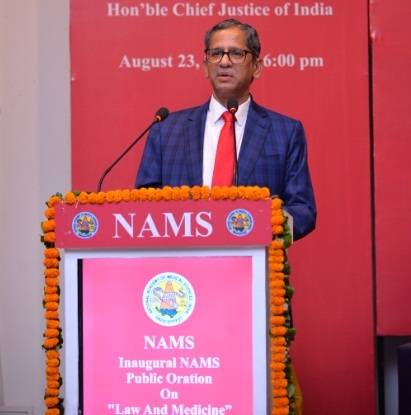The CJI also said that in contemporary times, the doctors play multiple roles – as healthcare providers, care givers, educators, managers, policy makers etc….reports Asian Lite News
Lamenting the “massive brain drain” of young, talented, and hardworking doctors, Chief Justice of India N.V. Ramana on Tuesday said the Central and state governments have a serious responsibility for the welfare of aspiring doctors from small towns and rural areas and to improve their working conditions.
In the inaugural National Academy of Medical Sciences (NAMS) Public Oration, he said: “Since there was no explicit mention of right to health under the Fundamental Rights, the Supreme Court, in the case of Bandhua Mukti Morcha, interpreted Article 21 to include right to health. In the case of Paschim Banga Khet Mazdoor Samity, the Supreme Court held that failure on the part of a government hospital to provide timely medical treatment to a person in need of such treatment results in violation of his right to life guaranteed under Article 21.”
“In a sense, I would say medicine and law are similar. We must keep ourselves abreast of the latest developments in our fields to be able to provide the best possible healthcare or legal representation. A good lawyer, like a good doctor, must always work earnestly towards imbibing and accumulating greater knowledge. The possibilities for growth in both fields are seemingly endless. Both medicine and law are one of the oldest professions in the world,” he added.

The CJI also said that in contemporary times, the doctors play multiple roles – as healthcare providers, care givers, educators, managers, policy makers etc.
“Our recent experience with Covid taught us the significance of robust healthcare for all. Especially in a country like India, where there is immense disparity in access to healthcare, doctors are accountable to the public. Exorbitant medical fees coupled with excessive barriers has made it almost impossible for the poor to get decent healthcare.
“It is primarily the cost of healthcare that is forcing people to suppress their health care needs and wellbeing. The heart-breaking fact is that, the crucial preventive stage is often lost when people suppress their health needs. They only approach the doctors when it is unmanageable and has crossed a certain threshold,” he added.
Since the patient typically has only a limited understanding of the illness and the process of treatment, the medical professional has a larger duty to the patient in a fiduciary relationship, he said.
He also noted that treatment for an individual involves various stakeholders. “They have to traverse through doctors, private hospitals and insurance companies. Through this process the patient blindly trusts only the doctors. It is doctor’s presence and involvement that gives the assurance to patients that they are not just consumers,” he said.
The Chief Justice then said that he “must come to a topic that I feel strongly about”.
“During the pandemic I saw various instances where doctors had been threatened, abused, attacked, and shunned. Despite this, they continued working on the front lines. This negative response towards doctors is truly unfortunate. Several false cases are being lodged against upright and hardworking doctors. They need a better, and more secure, working environment. We must foster an environment where more young people want to become doctors to serve Indian society.
“This attitude towards doctors is pushing out our best talents abroad. A massive brain drain is taking place where young, talented, and hardworking doctors do not see a future in India. We as a society must change this and incentivise our doctors to stay in India and continue their service and help meet both our medical and social goals,” he said.
He noted that the Central and state governments too have a serious responsibility.
“Many aspiring doctors from small towns and rural areas rely on the government for education, support and employment. But, beyond this initial support, the government must look out for the welfare of its doctors and improve their working conditions. The government must think of stronger incentives to make doctors accessible to rural population,” he said.

Leave a Reply